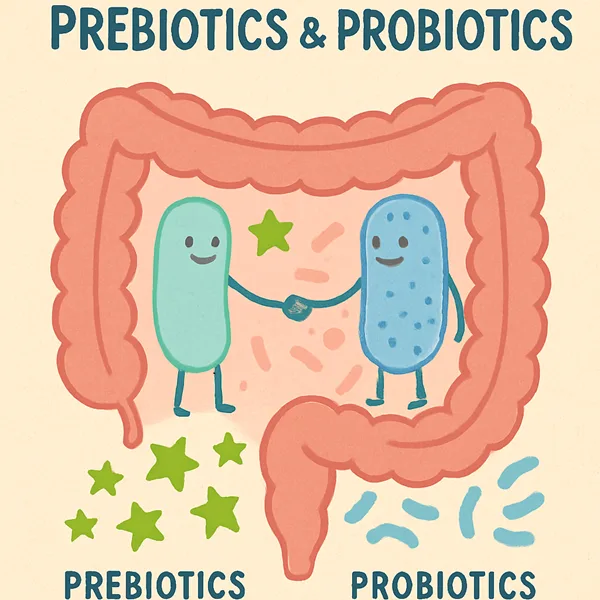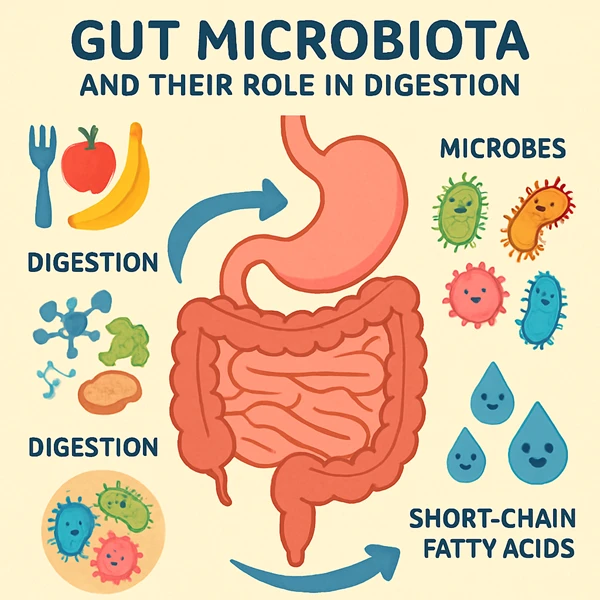What’s the Difference Between Prebiotic and Probiotic?
Quick answer: Prebiotics are indigestible fibres that *feed* your gut’s friendly bacteria, while probiotics are live microbes that *add* new bacteria. Combine both—think garlic plus yogurt—for optimum gut balance.

Prebiotics and probiotics are often mentioned in discussions about gut health. But what do they really mean? Understanding the difference between prebiotics and probiotics is key to improving your digestive health. Prebiotics are non-digestible fibers that feed the good bacteria in your gut. Probiotics, on the other hand, are live beneficial bacteria you can consume. Both play crucial roles in maintaining a healthy gut microbiome. Fermented foods like yogurt and kefir are rich in probiotics. Foods like garlic and onions are excellent sources of prebiotics. The synergy between prebiotics and probiotics is essential for gut health. They work together to balance your gut flora and improve digestion. This article will explore their benefits, sources, and applications for humans and dogs. By the end, you’ll know how to make informed choices for a healthier gut.
Understanding Gut Health: The Foundation
Gut health is the cornerstone of overall wellness. It affects everything from mood to metabolism. The gut houses trillions of bacteria, both good and bad. These bacteria, or microbiota, play a vital role in digestion. A balanced gut contains a diverse range of beneficial bacteria. This balance can prevent harmful pathogens from dominating. Gut health is linked to immune function and mental health. A healthy gut can improve mood and reduce anxiety. The gut-brain axis highlights the connection between the digestive system and the brain. It affects how we feel both physically and emotionally. Various factors influence gut health, including diet, stress, and medications. A balanced diet rich in fibers and probiotics supports gut health. Symptoms of poor gut health can include bloating, fatigue, and skin issues. Recognizing these signs is important for taking corrective measures. Key components that influence gut health include: Healthy bacteria, Prebiotics, Probiotics. Maintaining good gut health requires a combination of lifestyle choices. Regular exercise, stress management, and a nutritious diet are crucial. Understanding these basics is essential as you explore the roles of prebiotics and probiotics. Each plays a unique part in maintaining a healthy gut environment.
What Are Prebiotics?
Prebiotics are non-digestible fibers that feed beneficial gut bacteria. They play an essential role in fostering a balanced microbiome. Unlike probiotics, prebiotics aren’t bacteria. Instead, they support the growth and activity of existing healthy bacteria. Think of prebiotics as the fertilizer for your gut. They nourish the beneficial bacteria, helping them thrive. They aren’t broken down by stomach acids or digestive enzymes. This allows them to reach the colon intact. By feeding good bacteria, prebiotics help maintain a stable gut environment. This stability is crucial for proper digestion and nutrient absorption. Prebiotics also aid in enhancing the immune system. A well-nourished gut can better fend off harmful invaders. There are several key health benefits associated with consuming prebiotics. These include improved digestion and increased mineral absorption. Prebiotics work hand-in-hand with probiotics. Together, they form synbiotics, which synergistically support gut health. Some popular benefits of prebiotics include: Improved bowel regularity, Enhanced calcium absorption, Support for a healthy immune system. When choosing foods or supplements rich in prebiotics, variety matters. Diverse sources can lead to a more robust microbial community.
Common Sources of Prebiotics
Prebiotics are found naturally in various foods. Incorporating these into your diet can aid in boosting gut health. Foods high in prebiotics often contain complex carbohydrates. These carbs resist digestion and reach the colon intact. Some excellent sources of prebiotics include garlic, onions, and leeks. Each contributes to a more diverse and balanced gut microbiome. Bananas and asparagus are also rich in prebiotics. They not only support gut health but also offer other nutritional benefits. Whole grains, such as oats and barley, provide prebiotic fibers. They’re an easy addition to many meals. Including a range of these foods in your diet can enhance gut health. It’s both simple and effective. Here is a list of common prebiotic foods: Garlic, Onions, Bananas, Whole grains. Choosing a variety of prebiotic-rich foods helps ensure a healthy, balanced gut microbiome.
What Are Probiotics?
Probiotics are live microorganisms that provide health benefits when consumed. They are often referred to as “good” or “friendly” bacteria. These beneficial bacteria reside in your gut. They help balance the gut microbiota, improving digestion and supporting immune function. Probiotics are naturally found in fermented foods. They can also be taken as dietary supplements to enhance gut health. One of the primary roles of probiotics is to maintain a balanced microbiome. This helps prevent harmful pathogens from dominating the gut. Different strains of probiotics have varied health effects. Some may help reduce irritable bowel syndrome symptoms, others bolster the immune system. Probiotics work alongside prebiotics. They thrive in an environment enriched by prebiotic fibers. The benefits of probiotics extend beyond digestion. They can improve skin health, reduce the duration of colds, and even enhance mental well-being. Here are some potential advantages of incorporating probiotics: Reduction of digestive disorders, Improved nutrient absorption, Enhanced immune response. Probiotics can also play a role in restoring gut flora after antibiotic use. This is crucial for maintaining a balanced microbiome. When considering probiotics, it’s important to choose the right strains. Different strains can offer specific benefits tailored to individual needs.
Common Sources of Probiotics
Probiotics can be found in a variety of tasty and nutritious foods. Incorporating these foods can enhance your gut’s health. Fermented foods are typically rich in live bacteria. These foods have undergone natural fermentation processes, fostering beneficial bacterial growth. Yogurt is a well-known probiotic source. It often contains live cultures like Lactobacillus and Bifidobacterium, which support gut health. Another great source is kefir, a fermented milk drink. It’s packed with diverse probiotic strains, offering numerous health benefits. Sauerkraut and kimchi, both fermented vegetables, add probiotics to your diet. They also provide a dose of vitamins and minerals. Include a variety of these probiotic-rich foods for better health. It’s a delicious way to support your gut microbiome. Common probiotic foods include: Yogurt, Kefir, Sauerkraut, Kimchi. These foods not only aid digestion but also promote overall health by nourishing healthy bacteria.
Prebiotic vs Probiotic: Key Differences
Understanding the distinction between prebiotics and probiotics is essential for gut health. Both play complementary yet different roles. Prebiotics are non-digestible fibers. They serve as food for the beneficial bacteria already residing in the gut. Probiotics, on the other hand, are live bacteria that can be consumed. They introduce new strains of beneficial bacteria to the digestive system. One crucial difference lies in their interaction with the gut. Prebiotics enhance the growth and activity of existing good bacteria. Probiotics directly add to the population of good bacteria. They can restore balance, especially after a disruption like antibiotics. Both are vital but need each other to function optimally. Probiotics thrive in an environment nourished by prebiotic fibers. Exploring the specifics, here is a list of key features for both: Prebiotics: Found in garlic, onions, and whole grains, Not affected by heat or stomach acid, Promote gut bacteria growth. Probiotics: Found in yogurt and fermented foods, Sensitive to storage and heat, Balance gut bacteria population. The synergy between these two is known as synbiotics. Together, they contribute to a healthy and balanced gut microbiome. Selecting the right combination can optimize digestive health. Considering both dietary sources and supplements is beneficial.
How Prebiotics and Probiotics Work Together
Prebiotics and probiotics form a powerful partnership in maintaining gut health. Each has its unique function, yet they support each other in remarkable ways. Prebiotics are like gardeners nurturing the ecosystem. They provide the nourishment that beneficial bacteria, or probiotics, require to flourish within the gut. By feeding probiotics, prebiotics enhance their growth and activity. This enhanced growth leads to a more robust population of beneficial bacteria. Probiotics contribute by balancing the gut microbiota. They help replace and replenish the good bacteria that may be lost through poor diet or illness. Together, they enhance digestion and nutrient absorption. They also strengthen the immune system by maintaining the integrity of the gut barrier. Their combined effects are known as synbiotics. Synbiotics amplify the health benefits of each, leading to improved gut function. Understanding their synergy is key. Here’s a concise breakdown of their complementary roles: Prebiotics: Feed probiotics, Enhance probiotic growth, Increase probiotic activity. Probiotics: Balance gut microbiota, Restore beneficial bacteria, Improve digestion. Incorporating foods or supplements containing both can be highly beneficial. This combination can offer enhanced health benefits and improve overall well-being.
What Are Postbiotics? The Next Step in Gut Health

Postbiotics are lesser-known but increasingly important players in gut health. They are metabolic byproducts produced by probiotics during fermentation. These compounds include short-chain fatty acids, vitamins, and peptides. Despite being byproducts, they offer distinct health benefits. Unlike prebiotics and probiotics, postbiotics are not living organisms or nutrients. They are stable, making them easier to incorporate into products and diets. Benefits of postbiotics are promising. They can modulate the immune system, reduce inflammation, and improve gut barrier function. Recent studies highlight their potential. Postbiotics may help in reducing symptoms of certain gastrointestinal disorders. Incorporating postbiotics can enhance overall gut wellness. They complement the functions of both prebiotics and probiotics in maintaining gut health. Here’s a quick look at key postbiotics: Examples: Short-chain fatty acids (SCFAs), Vitamins, Peptides, Enzymes. Postbiotics may be the next step in optimizing gut health strategies. As research continues, their role is anticipated to expand.
Prebiotic vs Probiotic vs Postbiotic: A Side-by-Side Comparison
Understanding the differences between prebiotics, probiotics, and postbiotics is crucial. Each plays a unique role in the gut health ecosystem. Prebiotics are the fuel. They feed probiotics, stimulating their growth and activity in the gut environment. Probiotics are living bacteria that support digestion and strengthen immunity. They populate the gut with beneficial microbes. Postbiotics are the beneficial metabolites produced by probiotics. They regulate immune responses and help reduce inflammation. When examined side-by-side: Prebiotics: Non-digestible fibers, Feed probiotics, Found in garlic, onions, bananas. Probiotics: Live bacteria, Improve gut flora, Found in yogurt, kefir, sauerkraut. Postbiotics: Non-living byproducts, Modulate immune function, Produced during bacterial fermentation. Selecting a combination that includes all three can enhance overall gut health. Together, they create a balanced and healthy microbiome.
| Feature | Prebiotics | Probiotics |
|---|---|---|
| What they are | Non-digestible plant fibres | Live beneficial bacteria or yeast |
| Key foods | Garlic, onions, oats, banana, chicory | Yogurt, kefir, kimchi, sauerkraut, miso |
| Main benefit | Nourish existing microbes | Replenish & diversify gut microbes |
| Negative effects | Gas if taken in excess | Bloating in sensitive people |
Benefits of Prebiotics and Probiotics for Humans
Prebiotics and probiotics offer substantial benefits for human health. Each contributes uniquely to enhancing overall well-being. Prebiotics, for starters, are exceptional at supporting digestion. They promote regular bowel movements and alleviate constipation. Moreover, they enhance mineral absorption. This can lead to improved bone health by increasing calcium uptake. Prebiotics also play a role in weight management. They increase feelings of fullness, which can help regulate appetite. Their impact extends to heart health too. By reducing inflammation, prebiotics aid in maintaining cardiovascular wellness. Probiotics, on the other hand, are powerhouse bacteria. They aid digestion by balancing the gut flora. These microbes can reduce symptoms of irritable bowel syndrome (IBS) and diarrhea. They also support immune function. Probiotics contribute to mental health. The gut-brain axis links gut microbiome health to mood and cognition. There are numerous advantages worth noting: Prebiotic Advantages: Enhance digestion, Boost mineral absorption, Aid in weight management. Probiotic Advantages: Support immune health, Improve mental well-being, Alleviate gastrointestinal symptoms. Together, prebiotics and probiotics foster a harmonious gut environment. They work synergistically to support long-term health. Consider incorporating them into a balanced diet. They can be beneficial additions for achieving optimal wellness.
Prebiotic vs Probiotic for Dogs: What Pet Owners Should Know
Pet owners often wonder if their dogs might benefit from prebiotics and probiotics, just as humans do. Gut health is crucial for your dog’s overall wellness. Just like in humans, a balanced gut microbiome in dogs can improve digestion. Healthy bacteria help break down food efficiently. Prebiotics can be particularly helpful for dogs with digestive issues. They promote the growth of good bacteria and enhance gut function. Probiotics play a vital role as well. They introduce beneficial bacteria directly into the gut, boosting the dog’s immune response. For dogs with sensitive stomachs or frequent upset, probiotics may alleviate symptoms. They can also support recovery after antibiotic treatments. When choosing between prebiotics and probiotics for dogs, consider specific needs. Both have unique benefits, but one might be more suitable than the other. Here’s a list of potential benefits: Prebiotics for Dogs: Enhance gut flora, Improve nutrient absorption, Support regular bowel movements. Probiotics for Dogs: Boost immune health, Aid in digestive recovery, Alleviate symptoms of upset stomach. Ensuring your pet receives the right gut support involves careful choice. Consult your veterinarian for personalized advice.
Fermented Foods: Natural Sources of Probiotics
Fermented foods are a time-tested source of probiotics. They have been consumed for centuries across various cultures. The fermentation process involves breaking down sugars by bacteria and yeast. This not only preserves food but also enriches its probiotic content. Foods such as yogurt, kefir, and sauerkraut are well-known for their probiotic benefits. These foods enhance gut health when consumed regularly. Aside from improving digestion, fermented foods can boost immune function. Probiotic-rich diets may lead to better overall health outcomes. The variety of fermented foods available offers plenty of options. This allows individuals to experiment and find what suits their taste preferences. Here’s a shortlist of popular fermented foods: Yogurt: A creamy and versatile probiotic source. Kefir: A tangy drink with diverse bacteria strains. Kimchi: A spicy Korean side dish rich in probiotics. Sauerkraut: Fermented cabbage, simple yet effective. Miso: A fermented soybean paste, commonly used in soups. Incorporating these foods into meals offers potential health benefits. Regular consumption of fermented foods can support a balanced gut microbiome.
Nutritional Supplements: When and How to Use Them
Nutritional supplements can be a convenient source of prebiotics and probiotics. They offer concentrated doses, allowing for precise intake. These supplements can help those unable to get enough from diet alone. They are especially useful for people with specific dietary restrictions. However, not all supplements are created equal. Quality can vary greatly between brands and products. It’s crucial to select supplements that are scientifically backed and third-party tested. Timing is also important when taking supplements. Probiotic supplements, for example, are often best taken on an empty stomach or before meals to enhance absorption. Consider individual health needs before choosing supplements. Certain strains of probiotics are more effective for specific conditions. List of considerations when choosing supplements: Scientific validation: Look for evidence-backed products. Strain specifics: Some strains offer unique benefits. Dosage guidelines: Follow recommended daily amounts. Storage instructions: Many require refrigeration. Ingredient transparency: Check for any allergens. Consult a healthcare professional before starting any new supplement regimen. This ensures safety and efficacy tailored to individual needs. This step is essential to make informed and effective decisions.
Choosing the Right Option: Factors to Consider
Selecting between prebiotics and probiotics depends on several factors. Understanding these can guide effective decisions tailored to your health. First, consider your dietary habits. Those with diets lacking in fiber-rich foods might benefit from prebiotic supplements. Fiber helps nourish beneficial gut bacteria. Next, evaluate your digestive health. Frequent digestive issues may indicate a need for probiotics. Probiotics help balance gut bacteria, alleviating issues like bloating. Third, think about any specific health goals. For immune support or enhanced digestion, both prebiotics and probiotics might be beneficial. Choosing the right balance is key.
Here’s a checklist to consider:
- Dietary needs: Fiber intake and balance.
- Digestive health: Presence of regular digestive issues.
- Health goals: Specific conditions to address.
- Current medications: Influence of any medications you’re taking. Always consult with a healthcare provider when uncertain. They can provide tailored advice based on your unique health profile. This step is essential to make informed and effective decisions.
Conclusion: Building a Healthier Gut for Life
Achieving gut health is a journey, not a destination. It requires ongoing attention to diet and lifestyle choices. Prebiotics and probiotics are integral to this process, supporting a robust and diverse gut microbiome. They contribute to better digestion and stronger immunity. Incorporating a range of foods, including those rich in fibers and beneficial bacteria, can enhance this balance. Fermented foods and whole grains are excellent choices. Supplements may also play a role, particularly where natural sources fall short. They should be selected carefully and taken under professional guidance. By prioritizing gut health, you can improve overall well-being. It’s about making informed, sustainable choices that contribute to a healthier life for years to come.
What is the main function of prebiotics?
Prebiotics act as food for healthy bacteria, promoting their growth and activity in the gut.
How do probiotics benefit gut health?
Probiotics introduce beneficial bacteria, helping balance gut flora, which can aid digestion and improve immunity.
Can prebiotics and probiotics be taken together?
Yes, they can be combined to support a robust gut microbiome. This combination is often termed as “synbiotics.”
Are prebiotics and probiotics safe for everyone?
Generally, they are safe for most people. However, those with specific health conditions should consult a healthcare provider first.
What foods are rich in prebiotics and probiotics?
For prebiotics, look to foods like garlic and onions. Yogurt and kefir are excellent sources of probiotics.
When should I consider taking supplements?
Supplements can be beneficial when dietary intake is insufficient or specific health issues need addressing.
